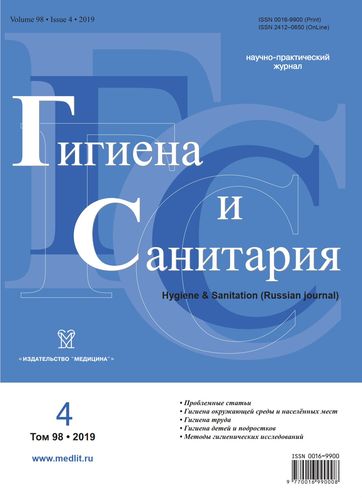Manifestation of the syndrome of emotional burnout at teachers in different periods of the educational year
- 作者: Bartosh T.P.1, Bartosh O.P.1
-
隶属关系:
- Research Center “Arktika” of the Far-Eastern Association of the Russian Academy of Sciences
- 期: 卷 98, 编号 4 (2019)
- 页面: 411-417
- 栏目: OCCUPATIONAL HYGIENE
- ##submission.datePublished##: 14.10.2020
- URL: https://archivog.com/0016-9900/article/view/640226
- DOI: https://doi.org/10.47470/0016-9900-2019-98-4-411-417
- ID: 640226
如何引用文章
全文:
详细
The results of the study of the severity and structure of the burnout syndrome among teachers living in the conditions of the North of Russia in different periods of the school year are presented. There were observed 29 teachers during the fourth quarter of the school year and 43 teachers in the first quarter, after the summer holidays. The average age of teachers amounted of 44 ± 1.8 years (from 23 to 65 years), teaching experience accounted for 20 ± 1.8 years (from 1 year to 45 years). The study of the indices of emotional burnout syndrome was carried out according to the questionnaire “Diagnosis of the level of emotional burnout” by V.V. Boyko. The level of neuropsychological adaptation was determined by the scale of I.N. Gurvich and situational and personal anxiety by Spielberger - Khanin. In the structure of the syndrome of emotional burnout among teachers in the North, the “Resistance” stage has been established to prevail at the beginning and at the end of the school year. The “Exertion” and “Depletion” stages are predominantly unformed or are in the formative stage. In the studied periods of the school year in the “Exertion” stage, teachers have an established and dominant symptom of experiencing traumatic circumstances. In the “Resistance” stage, the symptom of inadequate emotional response and the symptom of the reduction of professional duties are pronounced and dominant. The dominant symptom in the “Exhaustion” stage at the end of the school year was more often the symptom of personal detachment, and at the beginning of the school year - a symptom of psychosomatic and psycho-vegetative disorders. The severity of symptoms in the structure of burnout after school holidays decreases slightly, except for the symptom of the “Depletion” stage, personal detachment (depersonalization) (p <0.01). The formation of burnout syndrome in teachers occurs against the background of the development of anxiety and mental adaptation disorders. Positive correlations of neuropsychic adaptation and personality anxiety were found with almost all symptoms of the syndrome (r = 0.53-0.65; p <0.01). During training activities, teachers are in a state of chronic stress, which, against the background of prolonged exposure to extreme conditions in the Northeast, can lead to the development of mental maladjustment, professional deformation of the personality and exacerbation of chronic diseases.
作者简介
Tatiana Bartosh
Research Center “Arktika” of the Far-Eastern Association of the Russian Academy of Sciences
编辑信件的主要联系方式.
Email: tabart@rambler.ru
ORCID iD: 0000-0003-4993-5969
MD, Ph.D., leading researcher of the Research Center “Arktika” of the Far-Eastern Association of the Russian Academy of Sciences, Magadan, 685000, Russian Federation.
e-mail: tabart@rambler.ru
俄罗斯联邦O. Bartosh
Research Center “Arktika” of the Far-Eastern Association of the Russian Academy of Sciences
Email: noemail@neicon.ru
ORCID iD: 0000-0003-0211-1188
俄罗斯联邦
参考
- Pryazhnikov N.S., Ozhogova E.G. Emotional burnout and personal deformations in psychic and pedagogical activity. Bulletin of the Mocsow University. Series 14. Psychology. 2014; 4: 33-43. (In Russian).
- Mitina L.M. Teacher’s professional activity and health. М.: Akademiya, 2005. (In Russian).
- Borisova M.V. Psychological determinants of the phenomenon of teacher’s emotional burnout. Psychology issues. 2005; 2:96-104. (In Russian).
- Sorokina L.V., Popova O.A. Psychological health of teachers, its defining factors. Bulletin TGU. 2012; 17(2): 797-801. (In Russian).
- Malyarchuk N. N. The role of the teacher in the upbringing of culture of health of students in the modern socio-cultural educational environment. Siberian pedagogical magazine. 2012, 9;44-51. (In Russian).
- Skugarevskaya M.M. Emotional burnout syndrome. Medicine news. 2002; 7: 3–9. (In Russian).
- Classification of psychic and behavioral disorders. International classification. Edition 10 (МКB-10). Аvailable at: http://psychiatr.ru/download/1310 04.10.2017.
- Maslach C., Goldberg J. Prevention of burnout: New perspectives. Applied and Preventive Psychology. 1998 (7): 63-74.
- Boiko V.V. Emotion energy. SPb.: Piter, 2004. (In Russian).
- Orel V.E. Psychic burnout syndrome. Myths and reality. Khar’kov.: Humanitarian Center, 2014. (In Russian).
- Bartosh T.P., Bartosh O.P. The psychophysiological status and personality traits in teachers of the Magadan region. Hygiene and sanitation. 2010, 3: 42-46. (In Russian).
- Burke R.J., Greengalass E. A longitudinal study of psychological burnout in teachers. Human Relations. 1995; 48 (2): 187-202.
- Poulin J., Walter С. Social worker burnout: A longitudinal study. Social Work Research and Abstracts. 1993; 29 (4): 5-11.
- Raigorodskii D.Ya. edit. Practical psychodiagnostics. Methods and tests: Study guide. Samara.: BAKhRAKh-M; 2011. (In Russian).
- Demyanchuk R.V. Psychological Support for Teachers with Signs of Burnout: Base and Guidelines Reference Clinical Psychology and Special Education. 2015; 4 (4): 12–28. (In Russian).
- Naisberg F.S., Fennig S., Keinan G., Elizur A. Personality characteristcs and proneness to burnout: A study among physchiatrists. Stress Medicine. 1991; 1.7 (4): 201-5.
补充文件







